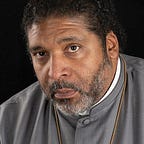Statement About The Passing Of George H.W. Bush
As President Bush is laid to rest, those who eulogize him don’t have to embellish his life or make him a man above men or suggest that he never engaged in bad policies or positions. As Peter in Scripture said, “We are men and women of like passions,” good & bad. Like all of us, like my father that I laid to rest years ago, he had strengths and weaknesses. We didn’t have to make him more in death than he was in life. We didn’t have to engage in selective amnesia, we just spoke of his love for God, his service to humankind, and prayed that in his less noble moments he did nothing that hurt far too many, nor did more against the call of God to love than he did for the call.
Maybe we might remember what Dr. King, who had strengths & weaknesses, said about death and eulogies…
“We all think about it. And every now & then I think about my own death & I think about my own funeral. And I don’t think of it in a morbid sense. And every now & then I ask myself, “What is it that I would want said?” And I leave the word to you this morning.
If any of you are around when I have to meet my day, I don’t want a long funeral. And if you get somebody to deliver the eulogy, tell them not to talk too long.
And every now & then I wonder what I want them to say. Tell them not to mention that I have a Nobel Peace Prize — that isn’t important. Tell them not to mention that I have three or four hundred other awards — that’s not important. Tell them not to mention where I went to school.
I’d like somebody to mention that day that Martin Luther King, Jr., tried to give his life serving others. I’d like for somebody to say that day that Martin Luther King, Jr., tried to love somebody.
I want you to say that day that I tried to be right on the war question. I want you to be able to say that day that I did try to feed the hungry. And I want you to be able to say that day that I did try in my life to clothe those who were naked.
I want you to say on that day that I did try in my life to visit those who were in prison.
I want you to say that I tried to love and serve humanity.
Yes, if you want to say that I was a drum major, say that I was a drum major for justice. Say that I was a drum major for peace. I was a drum major for righteousness. And all of the other shallow things will not matter.
I won’t have any money to leave behind. I won’t have the fine and luxurious things of life to leave behind. But I just want to leave a committed life behind. And that’s all I want to say…”
Maybe the best eulogy would be to talk about how Bush’s policies lifted the poor, the sick, the immigrant, and the children.
I heard one commentator say that it’s good to see people who are able to have major differences in politics but like each other personally. He noted how classy and nice everybody was at the National Cathedral. But I would remind all of us, myself included, that being able to come together in death and display niceties and respect at the funeral but not being able to pass health care to keep people from dying, stop attacks on immigrants seeking asylum, or pass living wages and climate regulations that could keep many from dying isn’t classy. It’s what Matthew 23:23 calls hypocrisy.
Matthew 23: 23–31
23 “Woe to you, teachers of the law and Pharisees, you hypocrites! You give a tenth of your spices — mint, dill and cumin. But you have neglected the more important matters of the law — justice, mercy and faithfulness. You should have practiced the latter, without neglecting the former. 24 You blind guides! You strain out a gnat but swallow a camel.
25 “Woe to you, teachers of the law and Pharisees, you hypocrites! You clean the outside of the cup and dish, but inside they are full of greed and self-indulgence. 26 Blind Pharisee! First clean the inside of the cup and dish, and then the outside also will be clean.
27 “Woe to you, teachers of the law and Pharisees, you hypocrites! You are like whitewashed tombs, which look beautiful on the outside but on the inside are full of the bones of the dead and everything unclean. 28 In the same way, on the outside you appear to people as righteous but on the inside you are full of hypocrisy and wickedness.
29 “Woe to you, teachers of the law and Pharisees, you hypocrites! You build tombs for the prophets and decorate the graves of the righteous. 30 And you say, ‘If we had lived in the days of our ancestors, we would not have taken part with them in shedding the blood of the prophets.’ 31 So you testify against yourselves that you are the descendants of those who murdered the prophets.
Perhaps all of us need to be reminded at public funerals that one day we will have to face God, no matter what people say about us. Reminded that this is no practiced run. Reminded that from president to pauper our day is coming. We will have to meet God and be examined by the One who asks, “When I was hungry, did you feed me? When I was naked, did you clothe me? When I was a stranger, did you welcome me?” These are the questions we all must face at the Last Judgement.
